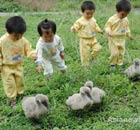Foreign and Military Affairs
Trawler captain heading home
By Bao Daozu (
China Daily
)Updated: 2010-09-25 07:46
 |
Large Medium Small |
Zhan flying back to Fujian after being held for two weeks in Japan
BEIJING - Japan said on Friday it was freeing the Chinese trawler captain it had held since collisions off the Diaoyu Islands two weeks ago.
The detention of 41-year-old Zhan Qixiong sparked the most serious row between the Asian giants for many years.
In announcing their decision to free Zhan, Japanese prosecutors said the deepening rift between Beijing and Tokyo played a role in their deliberations.
Zhan had been held since his boat was in collision with two Japanese coast guard vessels in the East China Sea.
"Considering the impact on Japan's people and the Japan-China relationship, we decided it would not be worth continuing to detain and investigate the captain," said Toru Suzuki, Naha district deputy chief prosecutor.
Suzuki said during a televised press conference that he was satisfied Zhan did not deliberately plan the incident.
Japanese public broadcaster NHK, also citing prosecutors, reported that "the Chinese captain will be sent back to China" but said the move would take time because formalities had to be ironed out.
Chinese Foreign Ministry spokeswoman Jiang Yu announced on Friday that the Chinese government will dispatch a charter plane to fly Zhan back home.
Jiang reiterated that China views any of Japan's so-called judicial procedures in the matter as illegal and invalid.
According to a source from the provincial government in Fujian province, the charter plane was expected to arrive at Changle Airport in Fuzhou, Fujian province, at about 3 am on Saturday with the captain on board.
The row began on Sept 8 when Japan's coast guard detained Zhan and his crew after his trawler was involved in collisions with two of their patrol boats near the Diaoyu Islands.
Zhan's 85-year-old grandmother suddenly passed away on the same day that she heard about her grandson's detention by the Japanese coast guard.
The collisions caused no injuries, but the diplomatic damage was severe.
China issued a series of diplomatic protests, summoned Japan's ambassador Uichiro Niwa six times and cancelled official visits and joint cultural events.
On Sept 13, Japan freed the ship's 14 Chinese crew members.
Chinese Premier Wen Jiabao warned on Thursday: "China will never give in or compromise on matters including national sovereignty, unity and territorial integrity."
The expected return follows the detention of four Japanese nationals, employed by Tokyo-based construction company Fujita, who allegedly entered a military zone without authorization and illegally videotaped military targets in the northern province of Hebei.
State security authorities in Shijiazhuang, capital of Hebei, responded to a report about their alleged illegal activities, Xinhua News Agency reported late Thursday.
Sino-Japanese relations hit a low point after the collision at sea off the Diaoyu Islands, which is Chinese territory but which is also claimed by Japan.
In addition, to high-level exchanges between Beijing and Tokyo being halted, Japan's tourism industry was hit by a large number of Chinese citizens and businesspeople canceling trips.
In addition some scheduled sister-city exchange programs were scrapped and the visit of a group of 10,000 Japanese youths to the World Expo in Shanghai was derailed, as were plans for a concert in China by the Japanese pop band SMAP.
It is estimated that more than 20 bilateral exchange programs on various levels were postponed or called off as a result of the rift, according to Kyodo News Agency.
Experts in China said Japan has done the right thing by releasing the captain.
"The return of our captain is what Japan needed to do. It was ridiculous to have detained him in the first place and Japan has now finally corrected its mistake," said Peng Guangqian, a senior Beijing-based expert on international relations. "Japan took the wrong step at the very beginning of this incident. Their intention to make the Diaoyu Islands into Japanese territory came to nothing."
Analysts said there was no connection between the detention of the four Japanese nationals and the release of the Chinese captain but said there definitely was a link between Zhan's release and China's economic responses.
"China has become the largest tourist source for Japan. The decline in the number of tourists to Japan will inevitably dampen the economic revival of that country, which saw only 0.1-percent economic growth in the second quarter of the year," said Zhou Yongsheng, a professor of Japanese studies at China Foreign Affairs University.
China's Ministry of Commerce has denied a report in the New York Times that said China had banned the export of some minerals to Japan but Zhou said such a possibility will be feared in Tokyo.
"The Japanese government is most unnerved by the idea of a ban on coal exports and other important raw materials that are crucial to Japan's industry," he said.
He Wei, Wang Chenyan contributed to this story.
China Daily







